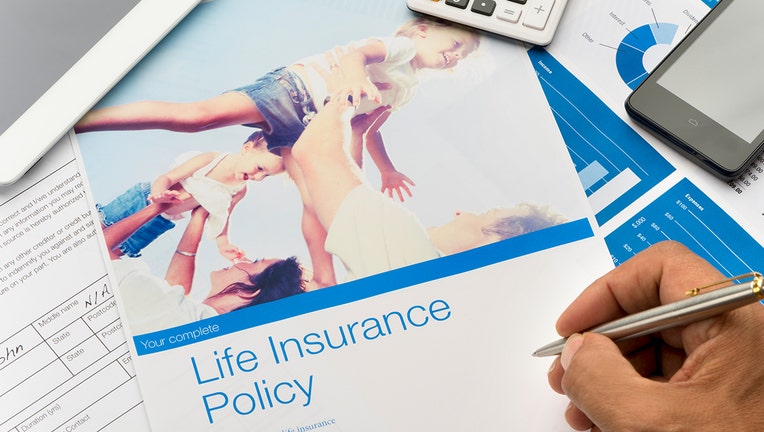Life insurance pros and cons: What you need to know

Purchasing life insurance coverage offers peace of mind, but at what cost? (iStock)
More than 500,000 Americans have died from the coronavirus pandemic, according to the Centers for Disease Control. Accordingly, mortality is on the minds of many who worry about providing for their loved ones in the event of their death. Having a solid financial plan in place is crucial, and life insurance is an integral part of that plan.
Buying life insurance is important, particularly life insurance for seniors. The pros and cons of life insurance plans vary, however, based on the term life, death benefits, and insurance premiums.
Whether you’re considering purchasing life insurance for the first time or increasing your coverage, visit Credible to explore your options.
While investing in a life insurance policy serves as a financial safety net, it can be costly, which is why understanding its benefits and disadvantages is so important.
Pros of having life insurance
1. Peace of mind
While thinking about your death may be uncomfortable, knowing that your loved ones will be financially secure after you’re gone offers some comfort. The person you designate as your beneficiary will receive the payout—also known as the death benefit—after your passing. These funds can be used to cover everything from funeral expenses and debt to mortgage payments and children's education.
2. Tax benefits
Unlike retirement plan proceeds, death benefits pass to beneficiaries tax-free. If you have a whole life insurance policy, which provides coverage that lasts for the entirety of your life so long as you continue to pay the premiums, there are additional tax advantages. With a whole life insurance policy, a portion of your premium will accumulate in a savings-style account that grows tax-deferred.
3. Savings when you need it
If you opt for a permanent or whole life insurance policy, you can access the cash value that has accumulated either by borrowing or withdrawing it. The amount available and the tax consequences will depend on the particulars of your policy. You can also choose to save the cash value to supplement your retirement savings.
HOMEOWNER’S INSURANCE: WHAT IT COVERS AND HOW IT WORKS
Cons of having life insurance
1. Another expense
No one wants to add another expense to the mix—especially if it means paying for something you hope you won’t need in the near future. Many people put off purchasing life insurance to avoid spending money on an intangible asset. While premiums vary based on the amount of coverage you choose, note that as you age the likelihood of your death increases, which means the cost of coverage will climb accordingly.
YOUR HOMEOWNERS INSURANCE POLICY SHOULD INCLUDE THESE 3 ITEMS, ACCORDING TO FINANCIAL EXPERTS
2. Cost of insurance
In addition to the amount of coverage you choose and your age, there are multiple other factors that determine the cost of your life insurance premiums. The type of coverage you select will impact how much you pay. For example, term life insurance, which covers you for a fixed number of years, is generally less expensive than whole life insurance, which provides coverage until your death. Your gender, medical history, job, and lifestyle, including health-related habits such as smoking, will also determine the cost.
To explore pricing and find the right life insurance plan to meet your needs, visit Credible.
3. There’s a learning curve
In addition to the ongoing expense, another downside of purchasing life insurance is determining which type of coverage you’d prefer and what you can afford. If it’s your first time looking into life insurance policies, you may feel overwhelmed by the range of options as well as the new terminology. Credible's experienced professionals can answer your questions and explain the differences in life insurance coverage options.
6 MISTAKES TO AVOID WHEN COMPARING CAR INSURANCE QUOTES ONLINE
Key takeaways
Regardless of how unpleasant it is to consider, death is a fact of life. While you can’t predict the future, you can prepare for the financial well-being of the loved ones you leave behind.
Purchasing life insurance, or increasing existing coverage ensures that you’re providing financial security even after you’re gone. Though it’s an additional expense, the peace of mind you’ll enjoy knowing your loved ones will be cared for is a benefit you’ll savor during your lifetime.
FILING AN AUTO INSURANCE CLAIM? AVOID THESE MISTAKES
If you’re considering purchasing your first life insurance policy or upping your coverage, remember the younger you are, the less expensive coverage is likely to be. Ready to check out your options? You can compare life insurance companies and shop their plans via Credible.
Have a finance-related question, but don't know who to ask? Email The Credible Money Expert at moneyexpert@credible.com and your question might be answered by Credible in our Money Expert column.

